Enhancing Patient Outcomes: First Nations Healthcare Strategies Report
VerifiedAdded on 2023/01/11
|6
|992
|63
Report
AI Summary
This report examines strategies to improve healthcare for First Nations people. It focuses on the role of hospitals in implementing cultural awareness and competency training for staff, including training in global citizenship, practicing good manners, and recognizing individuals beyond skin color, as well as asking about cultural backgrounds. The report also addresses how these strategies can improve patient outcomes. Furthermore, it explores the role of individual nurses and midwives in minimizing power differentials, such as by treating all patients respectfully and adhering to guidelines and legislations, and how these actions contribute to improved patient outcomes. The report emphasizes the importance of cultural sensitivity and respectful communication to foster trust and enhance the quality of care provided to First Nations communities, and includes references to relevant literature.

First Nations People
Paraphrase This Document
Need a fresh take? Get an instant paraphrase of this document with our AI Paraphraser
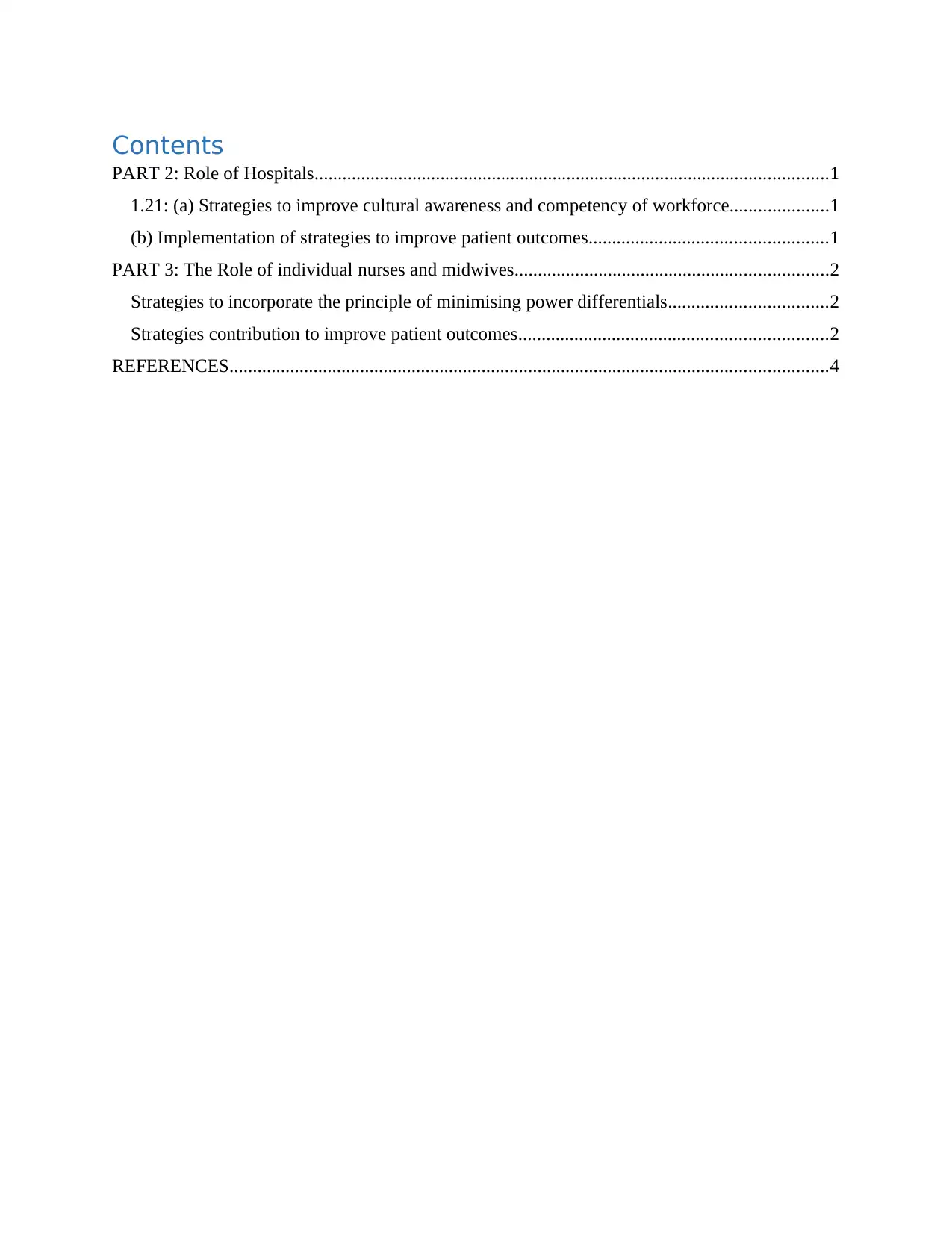
Contents
PART 2: Role of Hospitals..............................................................................................................1
1.21: (a) Strategies to improve cultural awareness and competency of workforce.....................1
(b) Implementation of strategies to improve patient outcomes...................................................1
PART 3: The Role of individual nurses and midwives...................................................................2
Strategies to incorporate the principle of minimising power differentials..................................2
Strategies contribution to improve patient outcomes..................................................................2
REFERENCES................................................................................................................................4
PART 2: Role of Hospitals..............................................................................................................1
1.21: (a) Strategies to improve cultural awareness and competency of workforce.....................1
(b) Implementation of strategies to improve patient outcomes...................................................1
PART 3: The Role of individual nurses and midwives...................................................................2
Strategies to incorporate the principle of minimising power differentials..................................2
Strategies contribution to improve patient outcomes..................................................................2
REFERENCES................................................................................................................................4
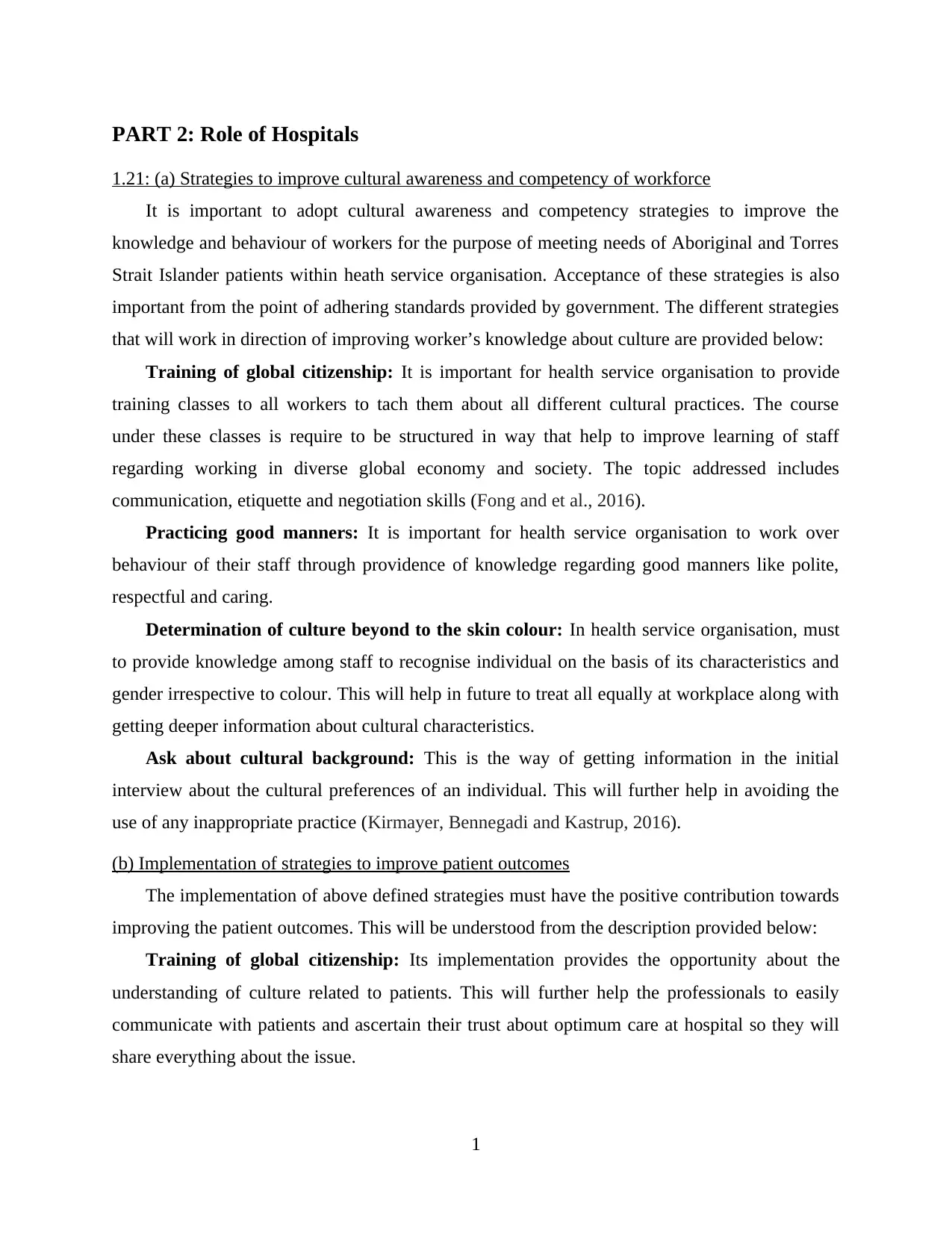
PART 2: Role of Hospitals
1.21: (a) Strategies to improve cultural awareness and competency of workforce
It is important to adopt cultural awareness and competency strategies to improve the
knowledge and behaviour of workers for the purpose of meeting needs of Aboriginal and Torres
Strait Islander patients within heath service organisation. Acceptance of these strategies is also
important from the point of adhering standards provided by government. The different strategies
that will work in direction of improving worker’s knowledge about culture are provided below:
Training of global citizenship: It is important for health service organisation to provide
training classes to all workers to tach them about all different cultural practices. The course
under these classes is require to be structured in way that help to improve learning of staff
regarding working in diverse global economy and society. The topic addressed includes
communication, etiquette and negotiation skills (Fong and et al., 2016).
Practicing good manners: It is important for health service organisation to work over
behaviour of their staff through providence of knowledge regarding good manners like polite,
respectful and caring.
Determination of culture beyond to the skin colour: In health service organisation, must
to provide knowledge among staff to recognise individual on the basis of its characteristics and
gender irrespective to colour. This will help in future to treat all equally at workplace along with
getting deeper information about cultural characteristics.
Ask about cultural background: This is the way of getting information in the initial
interview about the cultural preferences of an individual. This will further help in avoiding the
use of any inappropriate practice (Kirmayer, Bennegadi and Kastrup, 2016).
(b) Implementation of strategies to improve patient outcomes
The implementation of above defined strategies must have the positive contribution towards
improving the patient outcomes. This will be understood from the description provided below:
Training of global citizenship: Its implementation provides the opportunity about the
understanding of culture related to patients. This will further help the professionals to easily
communicate with patients and ascertain their trust about optimum care at hospital so they will
share everything about the issue.
1
1.21: (a) Strategies to improve cultural awareness and competency of workforce
It is important to adopt cultural awareness and competency strategies to improve the
knowledge and behaviour of workers for the purpose of meeting needs of Aboriginal and Torres
Strait Islander patients within heath service organisation. Acceptance of these strategies is also
important from the point of adhering standards provided by government. The different strategies
that will work in direction of improving worker’s knowledge about culture are provided below:
Training of global citizenship: It is important for health service organisation to provide
training classes to all workers to tach them about all different cultural practices. The course
under these classes is require to be structured in way that help to improve learning of staff
regarding working in diverse global economy and society. The topic addressed includes
communication, etiquette and negotiation skills (Fong and et al., 2016).
Practicing good manners: It is important for health service organisation to work over
behaviour of their staff through providence of knowledge regarding good manners like polite,
respectful and caring.
Determination of culture beyond to the skin colour: In health service organisation, must
to provide knowledge among staff to recognise individual on the basis of its characteristics and
gender irrespective to colour. This will help in future to treat all equally at workplace along with
getting deeper information about cultural characteristics.
Ask about cultural background: This is the way of getting information in the initial
interview about the cultural preferences of an individual. This will further help in avoiding the
use of any inappropriate practice (Kirmayer, Bennegadi and Kastrup, 2016).
(b) Implementation of strategies to improve patient outcomes
The implementation of above defined strategies must have the positive contribution towards
improving the patient outcomes. This will be understood from the description provided below:
Training of global citizenship: Its implementation provides the opportunity about the
understanding of culture related to patients. This will further help the professionals to easily
communicate with patients and ascertain their trust about optimum care at hospital so they will
share everything about the issue.
1
⊘ This is a preview!⊘
Do you want full access?
Subscribe today to unlock all pages.

Trusted by 1+ million students worldwide
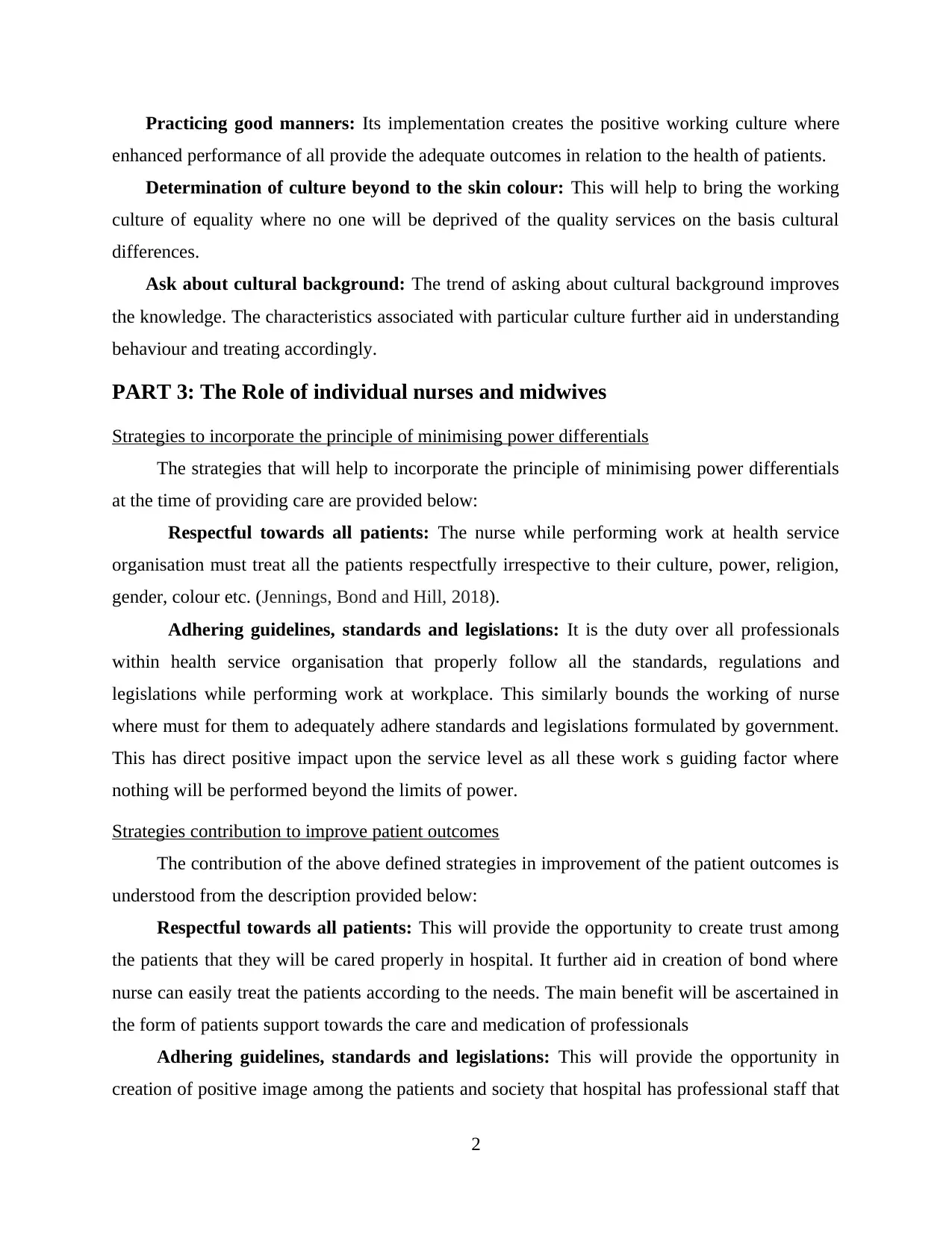
Practicing good manners: Its implementation creates the positive working culture where
enhanced performance of all provide the adequate outcomes in relation to the health of patients.
Determination of culture beyond to the skin colour: This will help to bring the working
culture of equality where no one will be deprived of the quality services on the basis cultural
differences.
Ask about cultural background: The trend of asking about cultural background improves
the knowledge. The characteristics associated with particular culture further aid in understanding
behaviour and treating accordingly.
PART 3: The Role of individual nurses and midwives
Strategies to incorporate the principle of minimising power differentials
The strategies that will help to incorporate the principle of minimising power differentials
at the time of providing care are provided below:
Respectful towards all patients: The nurse while performing work at health service
organisation must treat all the patients respectfully irrespective to their culture, power, religion,
gender, colour etc. (Jennings, Bond and Hill, 2018).
Adhering guidelines, standards and legislations: It is the duty over all professionals
within health service organisation that properly follow all the standards, regulations and
legislations while performing work at workplace. This similarly bounds the working of nurse
where must for them to adequately adhere standards and legislations formulated by government.
This has direct positive impact upon the service level as all these work s guiding factor where
nothing will be performed beyond the limits of power.
Strategies contribution to improve patient outcomes
The contribution of the above defined strategies in improvement of the patient outcomes is
understood from the description provided below:
Respectful towards all patients: This will provide the opportunity to create trust among
the patients that they will be cared properly in hospital. It further aid in creation of bond where
nurse can easily treat the patients according to the needs. The main benefit will be ascertained in
the form of patients support towards the care and medication of professionals
Adhering guidelines, standards and legislations: This will provide the opportunity in
creation of positive image among the patients and society that hospital has professional staff that
2
enhanced performance of all provide the adequate outcomes in relation to the health of patients.
Determination of culture beyond to the skin colour: This will help to bring the working
culture of equality where no one will be deprived of the quality services on the basis cultural
differences.
Ask about cultural background: The trend of asking about cultural background improves
the knowledge. The characteristics associated with particular culture further aid in understanding
behaviour and treating accordingly.
PART 3: The Role of individual nurses and midwives
Strategies to incorporate the principle of minimising power differentials
The strategies that will help to incorporate the principle of minimising power differentials
at the time of providing care are provided below:
Respectful towards all patients: The nurse while performing work at health service
organisation must treat all the patients respectfully irrespective to their culture, power, religion,
gender, colour etc. (Jennings, Bond and Hill, 2018).
Adhering guidelines, standards and legislations: It is the duty over all professionals
within health service organisation that properly follow all the standards, regulations and
legislations while performing work at workplace. This similarly bounds the working of nurse
where must for them to adequately adhere standards and legislations formulated by government.
This has direct positive impact upon the service level as all these work s guiding factor where
nothing will be performed beyond the limits of power.
Strategies contribution to improve patient outcomes
The contribution of the above defined strategies in improvement of the patient outcomes is
understood from the description provided below:
Respectful towards all patients: This will provide the opportunity to create trust among
the patients that they will be cared properly in hospital. It further aid in creation of bond where
nurse can easily treat the patients according to the needs. The main benefit will be ascertained in
the form of patients support towards the care and medication of professionals
Adhering guidelines, standards and legislations: This will provide the opportunity in
creation of positive image among the patients and society that hospital has professional staff that
2
Paraphrase This Document
Need a fresh take? Get an instant paraphrase of this document with our AI Paraphraser
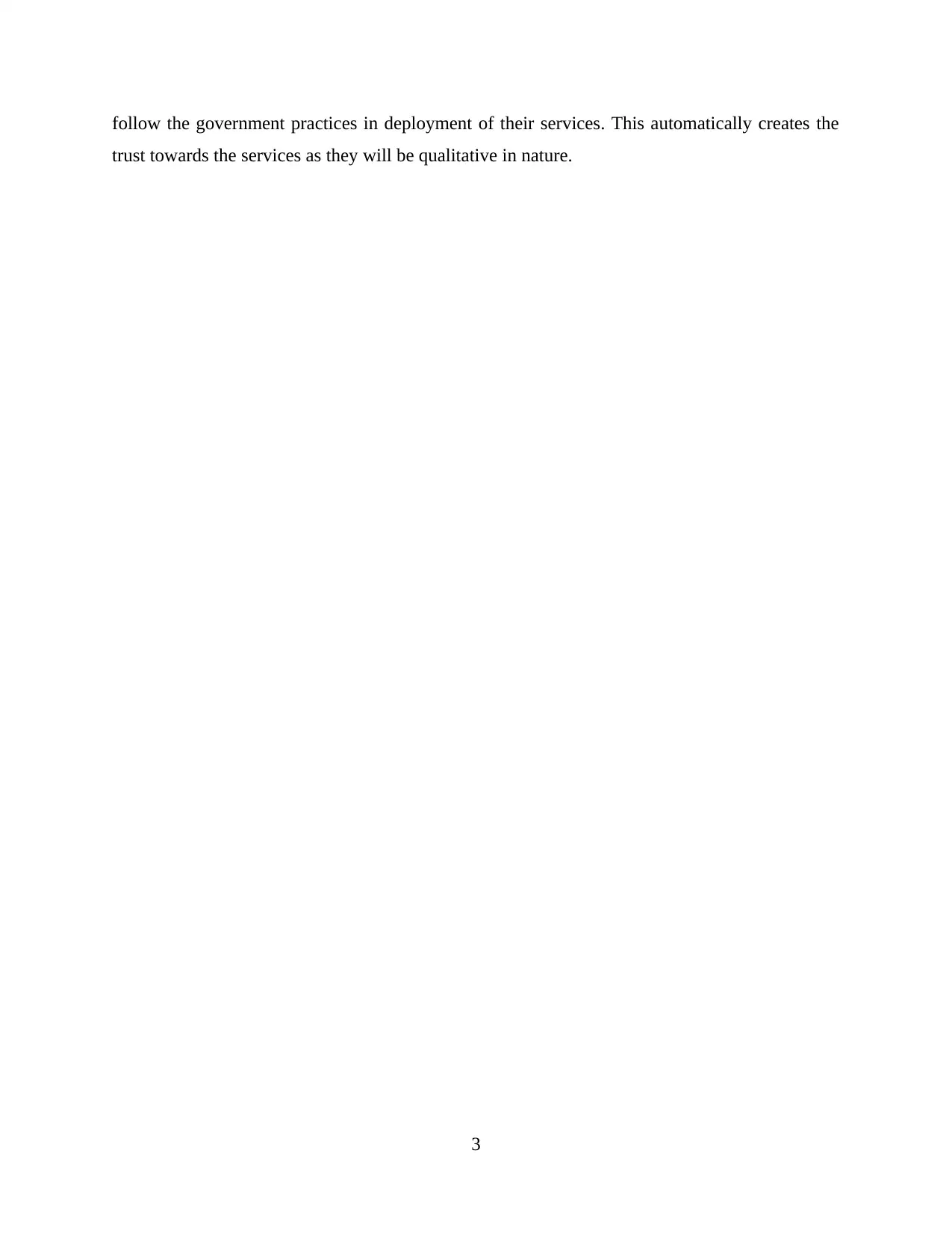
follow the government practices in deployment of their services. This automatically creates the
trust towards the services as they will be qualitative in nature.
3
trust towards the services as they will be qualitative in nature.
3
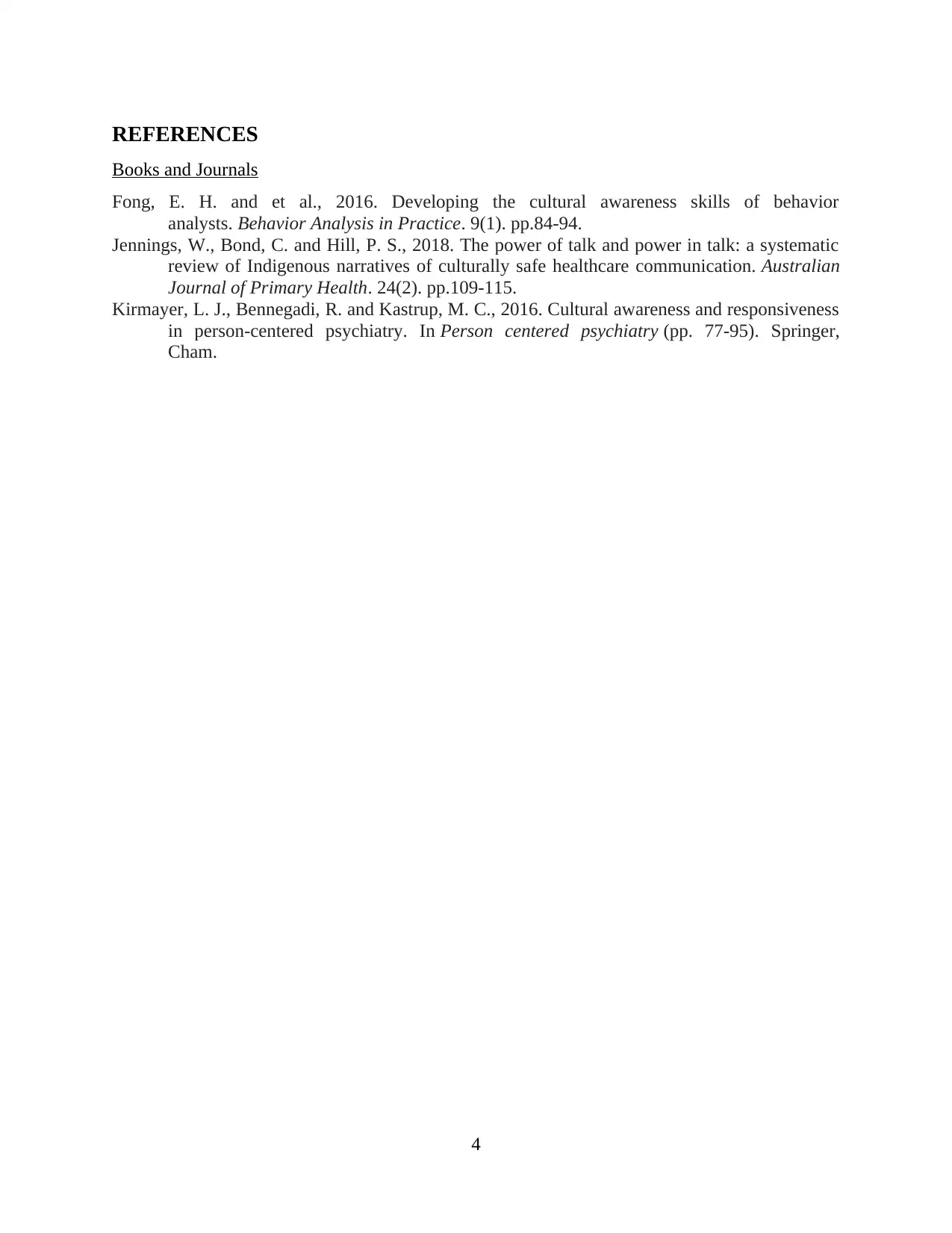
REFERENCES
Books and Journals
Fong, E. H. and et al., 2016. Developing the cultural awareness skills of behavior
analysts. Behavior Analysis in Practice. 9(1). pp.84-94.
Jennings, W., Bond, C. and Hill, P. S., 2018. The power of talk and power in talk: a systematic
review of Indigenous narratives of culturally safe healthcare communication. Australian
Journal of Primary Health. 24(2). pp.109-115.
Kirmayer, L. J., Bennegadi, R. and Kastrup, M. C., 2016. Cultural awareness and responsiveness
in person-centered psychiatry. In Person centered psychiatry (pp. 77-95). Springer,
Cham.
4
Books and Journals
Fong, E. H. and et al., 2016. Developing the cultural awareness skills of behavior
analysts. Behavior Analysis in Practice. 9(1). pp.84-94.
Jennings, W., Bond, C. and Hill, P. S., 2018. The power of talk and power in talk: a systematic
review of Indigenous narratives of culturally safe healthcare communication. Australian
Journal of Primary Health. 24(2). pp.109-115.
Kirmayer, L. J., Bennegadi, R. and Kastrup, M. C., 2016. Cultural awareness and responsiveness
in person-centered psychiatry. In Person centered psychiatry (pp. 77-95). Springer,
Cham.
4
⊘ This is a preview!⊘
Do you want full access?
Subscribe today to unlock all pages.

Trusted by 1+ million students worldwide
1 out of 6
Related Documents
Your All-in-One AI-Powered Toolkit for Academic Success.
+13062052269
info@desklib.com
Available 24*7 on WhatsApp / Email
![[object Object]](/_next/static/media/star-bottom.7253800d.svg)
Unlock your academic potential
Copyright © 2020–2025 A2Z Services. All Rights Reserved. Developed and managed by ZUCOL.





